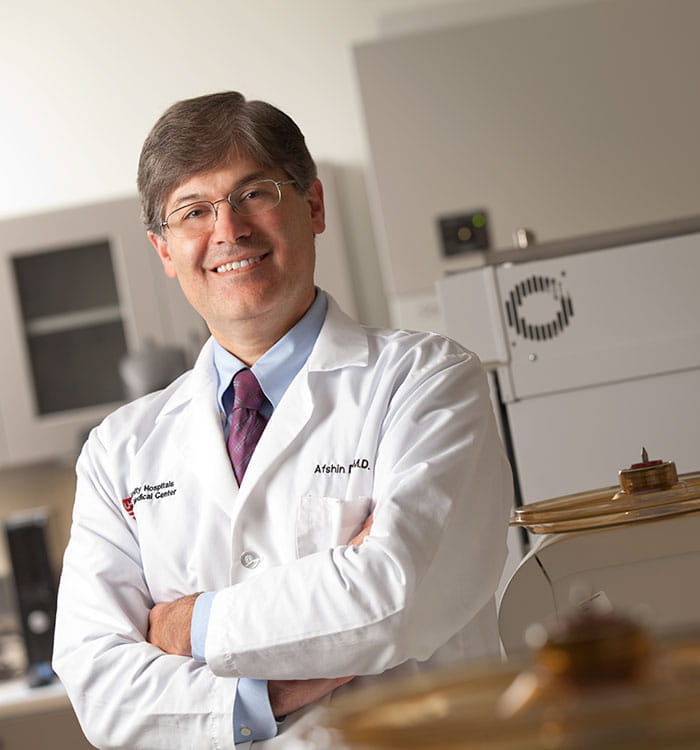UH Seidman Team Identifies New Subgroup of Small Cell Lung Cancer
May 09, 2023
Clinical trial borne from new findings showing promising results
Innovations in Cancer | Summer 2023
 Afshin Dowlati, MD
Afshin Dowlati, MDA research team led by UH Seidman Cancer Center thoracic oncology specialist Afshin Dowlati, MD, has identified a previously undescribed subgroup of small cell lung cancer (SCLC) and has pinpointed a treatment approach that appears to hold promise for patients with this specific subtype of cancer. The group recently published its findings in the journal Molecular Cancer Therapeutics.
Dr. Dowlati holds the Rosalie and Morton Cohen Chair in Lung Cancer and is the Lucille and Robert Gries Endowed Director of UH Seidman’s Center for Cancer Drug Development. He is also the cancer center’s Director of the Phase I & Thoracic Oncology Programs and Chief Academic Officer.
Why it matters: SCLC is one of the most aggressive solid tumors and affects more Americans than either pancreatic cancer or ovarian cancer.
“SCLC represents approximately 10 to 15 percent of all lung cancers and is characterized by a high growth fraction, propensity for early metastases and poor survival,” Dr. Dowlati says. “Although about 70 percent of SCLC tumors respond to chemotherapy, relapse rates are high.”
Also, he says, until now, SCLC has been a cancer that exhibits no currently targetable genetic mutations.
A research journey: The Dowlati team’s discovery is several years in the making. In 2016, Dr. Dowlati noted that certain of his SCLC patients were not responding to chemotherapy the way other SCLC patients do. With funding from the National Cancer Institute, he and his team launched a study into why that might be, relying on Dr. Dowlati’s extensive database of SCLC patients – the largest of any cancer center in the U.S at more than 1,000 patients. Their analysis of these chemorefractory SCLC patients showed something surprising, specifically when it came to the important SCLC tumor suppressor gene retinoblastoma 1 (RB1).
“It was felt that 100 percent of patients had retinoblastoma 1 alterations in a small cell lung cancer,” Dr. Dowlati says. “But we showed that those patients who are chemorefractory actually do not have the alterations. The term we use is RB1 wild-type, no mutations whatsoever.”
With funding from the National Institutes of Health, Dr. Dowlati and his team then identified that these RB1 wild-type patients have a much higher chance of response to the immunotherapy drugs known as checkpoint inhibitors, with their findings later validated in a large international study in SCLC.
Next, Dr. Dowlati and his team worked to identify drugs that would exploit these new findings for this subset of SCLC patients. After testing a variety of drugs in pre-clinical studies, the team arrived at the breast cancer drugs known as CDK 4/6 inhibitors, specifically palbociclib, showing that RB1 wild-type SCLC has a unique sensitivity to drugs targeting the CDK4/6 protein.
This made sense given the structure of the cell, Dr. Dowlati says.
“If you look at where the RB protein is in cellular function at the nucleus level, the CDK4/6 enzyme acts in conjunction with it,” he says. So from a biology standpoint, CDK4/6 enzyme and RB are part of one big complex.”
The team’s insight proved fruitful.
“SCLC cells and xenograft tumors with RB1 protein expression were sensitive to growth inhibition by the CDK4/6 inhibitor palbociclib, and this inhibition was shown to be dependent on RB1 expression by CRISPR knockout,” Dr. Dowlati says. “When we altered the RB1 gene in mice, suddenly the CDK4/6 inhibitor stopped working. What that tells us is that the CDK4/6 inhibitor worked because the RB1 protein was functional and intact.”
Back to bedside: Dr. Dowlati and his team have now launched a clinical trial at UH Seidman Cancer Center of a novel CDK4/6 inhibitor in patients with chemorefractory SCLC who are RB1 wild-type. Although the trial is not yet complete, results from one patient, published in Molecular Cancer Therapeutics, are encouraging, he says.
“This chemorefractory patient in her 50s had a major response and tumor shrinkage,” he says. “Our patient with biopsy-validated wild-type RB1 SCLC who received the CDK4/6 inhibitor abemaciclib demonstrated a dramatic decrease in mutant TP53 ctDNA allelic fraction from 62.1 percent to 0.4 percent and decreased tumor mass on CT scans.”
These findings suggest a new approach is needed for treating this subgroup of SCLC, Dr. Dowlati says. In fact, he says, it’s already happening, with major cancer centers across the U.S. now designating SCLC as RB proficient or RB mutant non-functional.
“Our study demonstrates that RB1 protein is an actionable target in a subgroup of SCLC, a cancer that exhibits no currently targetable mutations,” he says. “And it’s a good example of what can be accomplished when clinical care informs bench research. It’s bedside, to bench, then back to bedside, and now we’re actually seeing patients respond to the drug. We’re committed at UH Seidman Cancer Center and in our lab to is a strong model of translational research where discoveries are benefiting patients.”
For more information about this clinical trial or to refer a patient, please email Afshin.Dowlati@UHhospitals.org.
Contributing Expert:
Afshin Dowlati, MD
Rosalie and Morton Cohen Chair in Lung Cancer
Lucile and Robert H Gries Endowed Director
Center for Cancer Drug Development, University Hospitals
Director, Thoracic Oncology Program, UH Seidman Cancer Center
Director, Thoracic Oncology
Director, Phase I Drug Development Program
UH Cleveland Medical Center
Professor, Case Western Reserve University School of Medicine


